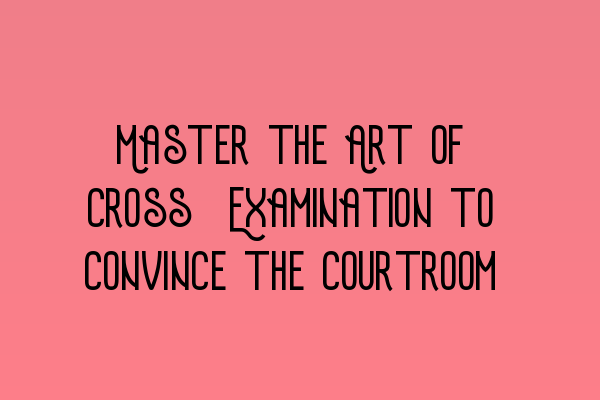Master the Art of Cross-Examination to Convince the Courtroom
Being able to effectively cross-examine witnesses is a critical skill for any criminal lawyer. It is during cross-examination that you have the opportunity to challenge the credibility and truthfulness of the witness, as well as elicit favorable evidence for your client’s case. A successful cross-examination can make a significant impact on the outcome of a trial. In this article, we will discuss some essential tips and techniques to help you master the art of cross-examination and convince the courtroom.
1. Prepare Thoroughly
Preparation is the key to a successful cross-examination. Before entering the courtroom, make sure you have thoroughly reviewed all available evidence, witness statements, and relevant case law. Develop a solid understanding of the facts and issues surrounding your case. This will allow you to formulate effective questions and anticipate possible answers from the witness. SQE 1 Practice Exam Questions and SQE 1 Practice Mocks FLK1 FLK2 courses can help you enhance your preparation skills.
2. Establish Control and Credibility
When cross-examining a witness, it is crucial to establish control and credibility. Maintain a confident and professional demeanor throughout the questioning. Adopt a polite but assertive tone, and clearly articulate your questions. Avoid lengthy or complex questions that may confuse the witness or dilute the impact of your examination.
3. Use Leading Questions
Leading questions are a powerful tool in cross-examination. These are questions that suggest the answer or put words into the witness’s mouth. By using leading questions, you can control the narrative and subtly influence the witness’s answers. For example, instead of asking, “What happened next?” you could ask, “Isn’t it true that the defendant immediately left the scene?” This technique allows you to guide the witness towards the desired response.
4. Challenge Inconsistencies and Bias
Cross-examination is an opportunity to challenge inconsistencies in the witness’s testimony. Carefully review the witness statements and prior statements they may have made. If you identify any contradictions or inconsistencies, gently confront the witness with those discrepancies. Additionally, be alert for any potential bias or motive the witness may have, and use targeted questioning to expose it.
5. Listen Carefully and Adapt
During cross-examination, it is crucial to listen carefully to the witness’s answers. Pay attention to any unexpected or favorable responses that may present opportunities to strengthen your case. Be flexible and adapt your questioning based on the witness’s answers. By actively listening and adapting, you can exploit weaknesses in the witness’s testimony and present a compelling argument to the courtroom.
6. Respect the Witness
While cross-examining a witness, it is essential to maintain respect and professionalism. Avoid aggressive or confrontational behavior that may alienate the jury or judge. Treat the witness with courtesy, even if their testimony is adverse to your client’s case. By showing respect, you can maintain credibility and ensure that your argument is fairly considered by the court.
7. Practice, Practice, Practice
Mastery of cross-examination requires practice. Regularly participate in mock trials and simulations to refine your skills. Utilize SQE 2 Preparation Courses and SQE 1 Preparation Courses to gain practical experience and receive feedback from experienced professionals. The more you practice, the more comfortable and confident you will become in the courtroom.
In Conclusion
Cross-examination is an essential skill for any criminal lawyer. By preparing thoroughly, establishing control, using leading questions, challenging inconsistencies, adapting to the witness’s responses, respecting the witness, and practicing regularly, you can master the art of cross-examination and convince the courtroom of your client’s innocence. Remember, effective cross-examination can be a game-changer, so invest the time and effort to hone your skills.
For more information on SQE exams and related resources, SRA SQE Exam Dates are available to help you stay informed.
